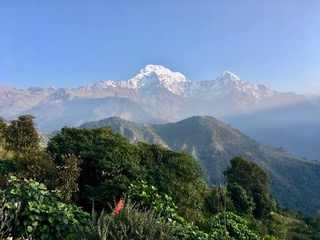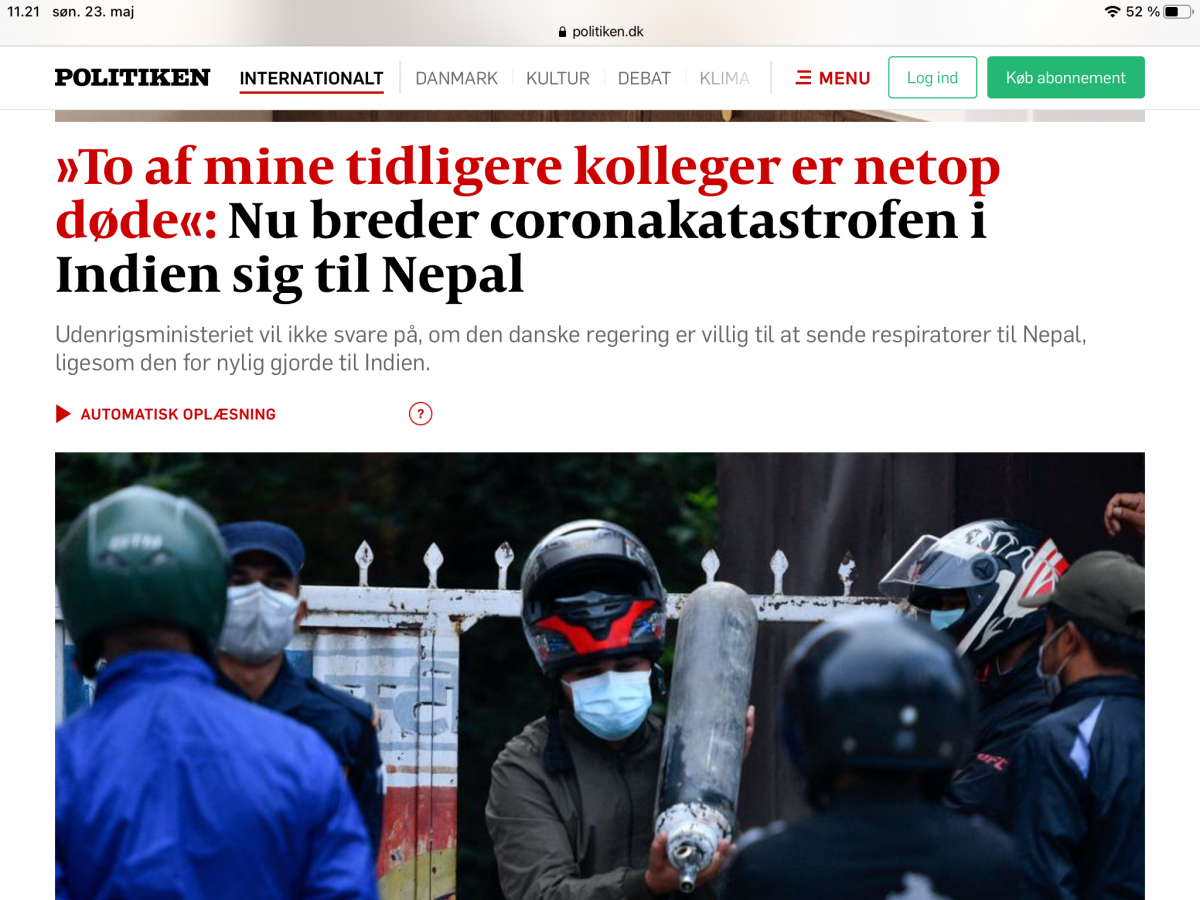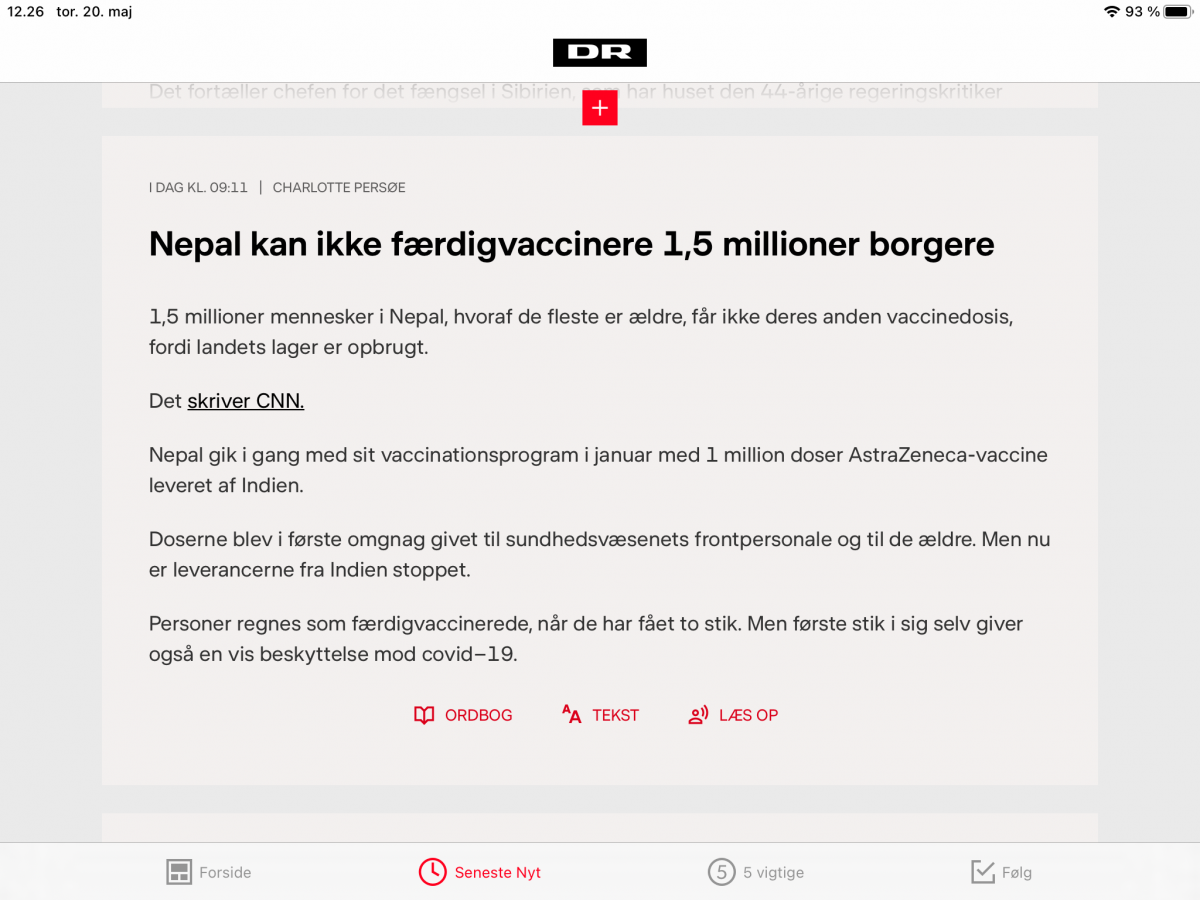En appel – trykt i Politiken 21/5-21
Vi skriver på vegne af forskere, organisationer og frivillige med tilknytning til Nepal for at anmode den danske stat om at yde Nepal øjeblikkelig støtte i forbindelse med den voldsomme eskalering af covid-19 i landet igennem de seneste uger.
Der har med god grund været stor global bevågenhed om den dramatiske udvikling af anden bølge i Indien. Vi anerkender og værdsætter den hjælp, som den danske stat allerede har ydet Indien, men er samtidig dybt bekymrede for, at nabolandet Nepal, som er endnu dårligere rustet til at håndtere epidemien, bliver overset.
Vi skriver i forlængelse dels af premierminister K.P. Olis appel i The Guardian 10. majom nødvendigheden af øjeblikkelig international støtte, dels af de utallige personlige beretninger, vi alle modtager dagligt om familie, venner og kolleger, der ikke kan få den nødvendige behandling, og som følge heraf mister livet.
Situationen er, som beskrevet af Jeremy Farrar, direktør for Wellcome Trust, UK, beyond frightening . Nepal har en af de højeste covid-19-reproduktionsrater i verden med en positivprocent på 47 og registrerer 8-9.000 smittede per døgn. De reelle tal vurderes dog at være betragteligt højere.
Nepal deler en 1.880 kilometer lang åben grænse med Indien, og forholdet mellem befolkningen i grænseområderne er karakteriseret ved tætte kulturelle, økonomiske og familiebaserede bånd. Virus kender ikke landegrænser, og krisen må løses samtidigt på begge sider af grænsen.
Den nuværende bølge af infektioner i Nepal vurderes at være cirka to uger forsinket i forhold til i Indien. Den gennemsnitlige positivprocent har over de sidste to uger været på ca. 45 og er betragteligt højere i landsbyer og byer nær den indiske grænse. Positivprocenten i hovedstaden Katmandu er over 50.
Sundhedssystemet er reelt brudt sammen: Der er på nationalt plan færre end 1.600 intensivpladser, hospitalerne må afvise patienter ved døren, der er alarmerende mangel på ilt, medicin og basal pleje, og på mange hospitaler må covid-19-smittede læger og sygeplejersker passe patienter. Det skal ses i lyset af, at Nepals læge-patient-ratio (1:1.724) i forvejen er en af de laveste i verden, endnu lavere end Indiens (1:1.456).
Endvidere er planlagte vaccineleverancer fra Indien stoppet, hvilket betyder, at de få, der har fået første dosis, ikke kan blive færdigvaccineret, medmindre der åbnes for alternative leverancer.
Det nepalesiske sundhedsministerium skønner, at antallet af nye smittede kan nå 800.000 medio juli. Der er udsigt til en humanitær katastrofe, som kræver øjeblikkelig handling fra det internationale samfund.
Danmark har været en vigtig støtte af Nepals demokratiske og økonomiske udvikling siden begyndelsen af 1990’erne. Ønsket om forandring var bredt funderet i befolkningen, og dansk bistand støttede op herom igennem forskellige projekter og programmer.
Selv om der var udfordringer undervejs – bl.a. borgerkrig og jordskælv – gjorde den danske bistand en forskel. Med covid-19 undermineres mange af udviklingsgevinsterne. Risikoen er, at økonomien svækkes, fattigdommen stiger, social og økonomisk ulighed øges, og at samfundet som helhed destabiliseres yderligere.
Covid-19 tager i udgangspunktet ikke hensyn til kaste, køn, klasse, etnicitet eller religion i Nepal, men som det er set andre steder i verden, forstærker pandemien ikke desto mindre allerede eksisterende ulighed. Mange er ikke i stand til at betale for behandling af covid-19 og har opgivet at søge hjælp.
SELV OM Danmark er holdt op med at give bilateral bistand til Nepal, fortsætter de gode relationer mellem de to lande.
Vi opfordrer Danmark til at yde akut humanitær støtte til den nepalesiske befolkning i form af: medicinsk udstyr som respiratorer, iltudstyr og tests; overskydende vacciner, som er trukket ud af det danske vaccinationsprogram, men som kunne gøre meget stor gavn i Nepal ved at fylde det aktuelle hul i forsyningen, inden tidsrammen for anden dosis overskrides; at Danmark bidrager til at sætte fokus på situationen i Nepal i internationale fora som EU og FN.
Appellen er underskrevet af:
Rajeshwar Acharya, ph.d.-studerende, Aarhus Universitet; Jytte Agergaard, lektor, Københavns Universitet; Inger Marie Arildsen, forperson, Dansk Nepalesisk Selskab; Rune Bennike, adjunkt, Københavns Universitet; Torsten Rødel Berg, forskningsrådgiver, Aarhus Universitet; Stephen Carney, professor mso, Roskilde Universitet; Ravi Chettri, forsker, DTU/forperson, Nepalese Scientific-Academic Panel in Denmark; Dan V. Hirslund, lektor, Københavns Universitet; Rabindra Khadka, forperson, Non-resident Nepali Association Denmark; Pernille Kruse Madsen, direktør, Human Practice Foundation; Ulla Ambrosius Madsen, lektor, Roskilde Universitet; Lone Petersen, forperson, Jysk Landsbyudvikling i Nepal; Mariève Pouliet, lektor, Københavns Universitet; Rebecca L. Rutt, adjunkt, Københavns Universitet; Jens Seeberg, professor mso, Aarhus Universitet; Carsten Smith-Hall, professor, Københavns Universitet; Flemming Topsøe, prof.em., Københavns Universitet/forperson, BelhiGruppen Nepal; Pia Torp, forperson, Chimalaya Charity; Thorsten Treue, lektor, Københavns Universitet; Karen Valentin, lektor, Aarhus Universitet; Todd Wallenius, ph.d.-studerende, Aarhus Universitet; Cameron David Warner, lektor, Aarhus Universitet; Neil Webster, seniorforsker, Dansk Institut for Internationale Studier; Tim Whyte, generalsekretær, Mellemfolkeligt Samvirke



